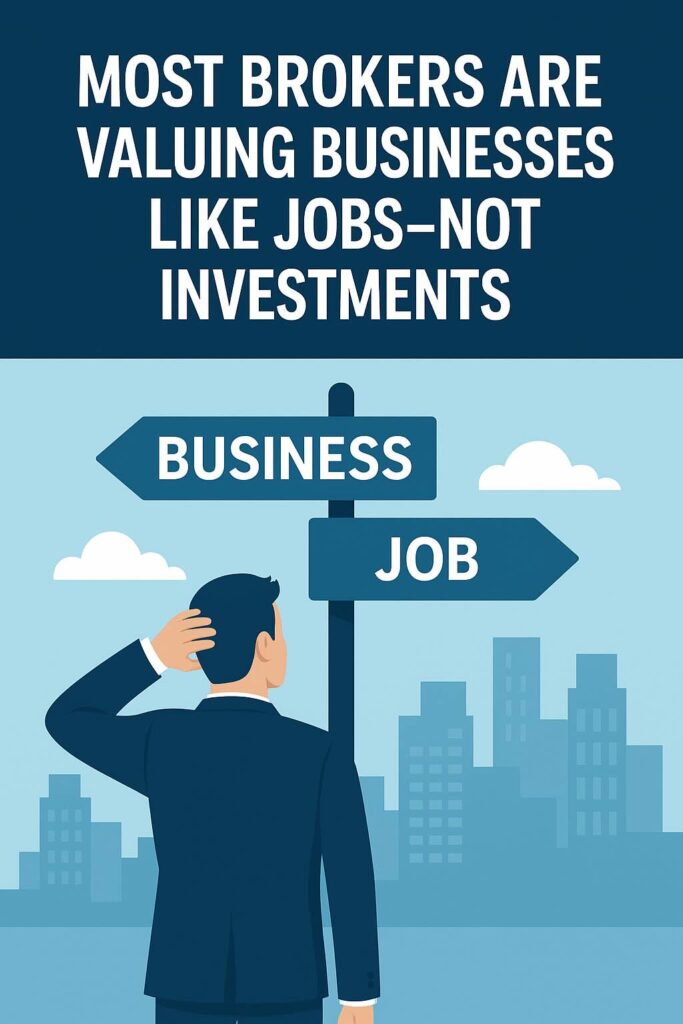
Most Brokers Are Valuing Businesses Like Jobs—Not Investments
After selling five of my own companies, I’ve come to appreciate the difference between a business that’s truly investable and one that’s just a glorified job. But what surprises me is how many business brokers still don’t seem to get it—or worse, they ignore it to make their listings look better.
The most common and dangerous mistake I see? Adding back a full-time owner’s salary as if it’s a discretionary expense.
Let’s be real: If the owner is working 40+ hours a week doing sales, operations, and client management, their salary isn’t “optional.” It’s the cost of labor required to keep the business running. Removing that expense from earnings makes the business look more profitable than it really is—and that can derail deals quickly.
A Real Example: The HVAC Company That Wasn’t What It Seemed
Not long ago, I had a client interested in buying an HVAC business. On paper, it looked fantastic. Strong revenue, solid customer base, clean books, and growing market demand. The broker was promoting it with a high SDE and implied earnings that suggested a solid return.
But when we dug deeper, we found that the owner was doing almost everything. Sales, service calls, estimates, managing the team, scheduling, ordering parts—you name it. He wasn’t just steering the ship; he was the ship.
And yet, the broker had added back 100% of the owner’s salary into the earnings.
Let’s break that down: You can’t remove the salary of someone doing 60+ hours a week of work and claim it as “profit.” Whether it’s the buyer stepping into those shoes or a new hire brought in to cover that role, that work has to be done. And it has to be paid for.
So what was the broker really selling? Not an investment. A job.
This is exactly the kind of misrepresentation that kills credibility, confuses buyers, and leads to broken deals. And it’s happening far too often.
Buyers Want Investments—Not a 50-Hour Workweek
Most serious buyers, especially financial buyers or first-time entrepreneurs, aren’t shopping for a job. They want a business with systems, a team, and infrastructure that allows them to grow or manage the company without becoming a full-time employee.
When brokers inflate earnings by removing necessary wages, they create a false sense of ROI. That misalignment becomes a big problem during due diligence when buyers realize they’ll either have to take on the owner’s workload themselves—or cut their expected profit significantly to pay someone else to do it.
Strategic Buyers Are Different—but Rare
Yes, in some cases a strategic buyer may be able to consolidate roles, use their existing team, or gain synergies that justify adding back certain costs. But those are special cases—and they only apply when such a buyer is at the table.
Valuing a business for a strategic buyer before you’ve identified one is just wishful thinking. It doesn’t reflect the actual buyer pool, and it misleads everyone involved.
Ask the Hard Question: Do They Really Understand Business?
Here’s the question I always come back to:
Are these brokers inflating numbers just to win listings, or have they simply never owned a business themselves?
If you’ve never had to make payroll, manage a team, or deal with the chaos of growth, it’s easy to fall into the trap of thinking like a spreadsheet—not an operator. That disconnect leads to bad valuations, wasted time, and frustrated buyers.
When I sold my businesses, I made sure the numbers reflected what it would cost to replace me. That didn’t make the deals worse—it made them stronger. Buyers respected the transparency and knew they were walking into a real business, not a smoke-and-mirrors profit machine.
What You Should Demand
Whether you’re buying or selling, these are the questions you need to ask:
- Sellers: “Will this valuation still make sense when I’m out of the picture?”
- Buyers: “What will it cost to replace the work the owner is doing?”
- Everyone: “Has this broker ever run a business, or are they just trying to make a spreadsheet work?”
Final Thoughts
Selling a business isn’t about creating the highest number possible—it’s about presenting something real. Something sustainable. Something that will stand up to scrutiny.
I’ve done this five times with my own companies. Every one of them sold with valuations grounded in operational reality, not padded with fantasy numbers. That’s how deals get done. And it’s how reputations are built.
So next time you’re evaluating a business—or a broker—remember this: If the numbers only work when you pretend the owner’s role doesn’t exist, they don’t work at all.

